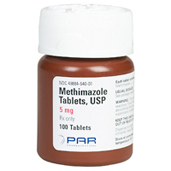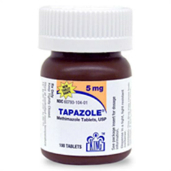The thyroid gland is part of a cat's
endocrine or hormonal system. The hormones that the gland produces
are essential for normal metabolism and growth. When a cat's
body produces higher than normal amounts of thyroid hormone, the disease
hyperthyroidism is the result. Hypothyroidism or the underproduction
of thyroid hormone is very rare in cats.
"The disease often results in high
blood pressure and a form of heart disease called hypertrophic cardiomyopathy,
both of which can be fatal."
Hyperthyroidism is most commonly diagnosed
in middle-aged to older cats. The disease usually develops when a benign
tumor that secretes large amounts of thyroid hormone forms within the
thyroid gland.
The Signs of Hyperthyroidism in Cats
Cats that develop hyperthyroidism typically
have one or more of the following symptoms:
- Weight loss
- A good or even ravenous
appetite
- An increased activity level
- Vomiting
- Diarrhea
- Increased thirst and urination
Veterinary and Home Care for Hyperthyroidism

If you suspect that your cat has hyperthyroidism,
take her to the veterinarian. The disease often results in high
blood pressure and a form of heart disease called hypertrophic cardiomyopathy,
both of which can be fatal. During a physical examination, your
vet may be able to detect:
- A heart murmur
- A rapid heart rate
- An abnormal heart rhythm
- A palpably enlarged thyroid gland
To definitively diagnose hyperthyroidism,
your veterinarian will take a sample of blood to measure the amount
of circulating thyroid hormone. He or she will also look at the
results of routine blood work, a urinalysis, blood pressure measurements
and chest x-rays to rule out other diseases that cause similar symptoms
and to get an idea of your cat's overall health. Additional
diagnostic tests may be necessary depending on your cat's condition.
Owners of hyperthyroid cats have several
different options for treatment. Your veterinarian can help you
pick the one that is most appropriate for you and your cat. The
oral medication methimazole can be given twice a day to reduce the production
of thyroid hormone. The drug itself is not very expensive, but
it does need to be given for the rest of the cat's life. Regular
rechecks with your veterinarian are also necessary to make sure that
a cat's dose doesn't need to be changed and that other health problems
are not developing.

If a more permanent solution is desired,
an injection of a mildly radioactive form of iodine can be given.
This is generally very safe and effective, although it does require
hospitalization at a specialty practice until the cat is no longer giving
off potentially dangerous levels of radioactivity, and it costs more,
at least initially, than treatment with methimazole.
Finally, surgically removing the thyroid
gland is also possible, although this treatment is not as popular as
it once was due to its potential side effects and the increasing availability
of radioactive iodine therapy.
The above is provided for information purposes only and should not be used for the diagnosis or treatment of any condition.
This information does not cover all possible variables, conditions, reactions, or risks relating to any topic, medication, or product and should not
be considered complete. Certain products or medications may have risks and you should always consult your local veterinarian concerning the treatment of
your pet. Any trademarks are the property of their respective owners.